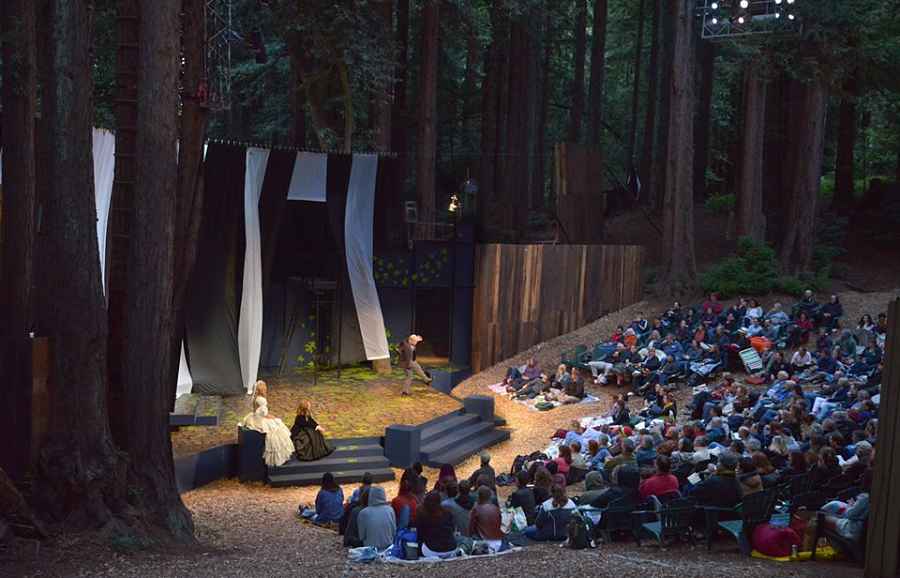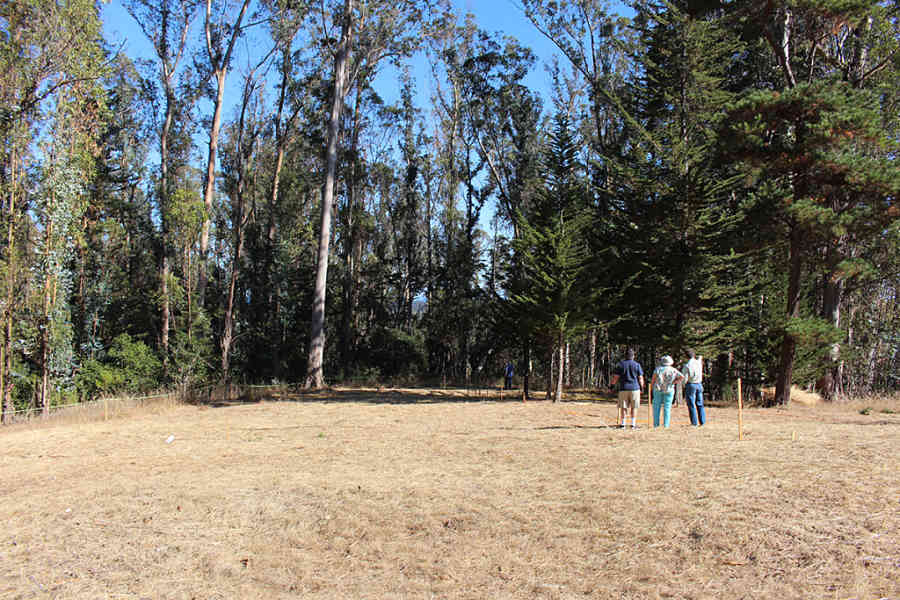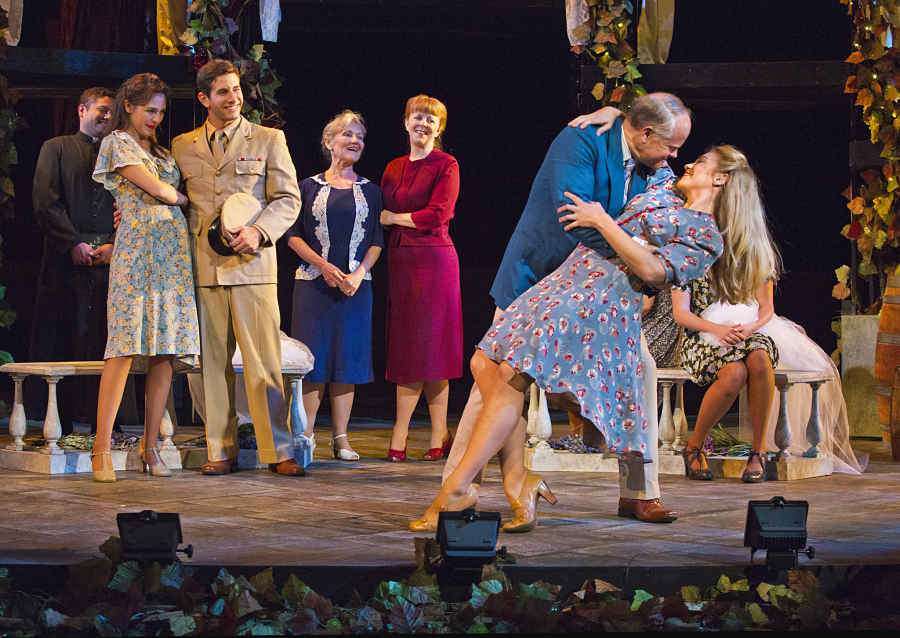SANTA CRUZ, CALIF.: On Tuesday evening, Santa Cruz Shakespeare officially got approval from the Santa Cruz City Council to set up shop in a new outdoor performance space at the city’s Upper DeLaveaga Park. This comes as a huge relief for the acclaimed summer Shakespeare festival, which had found out less than a year ago that it could no longer use its longtime outdoor stage on the University of California Santa Cruz campus. The unanimous vote of the Santa Cruz City Council came at 10 p.m. sharp, ending the Feb. 9 meeting after a long discussion of various stipulations to improve road access to the park and ensure that neighbors’ concerns would continue to be heard.
Santa Cruz Shakespeare plans to announce its 2016 season on Feb. 25. Artistic director Mike Ryan says the season will consist of two mainstage shows (plus the usual intern “fringe” show), as opposed to last year’s three-play season, to allow as much time as possible to get the new location ready. The timeline remaining to build the theatre space before the planned opening on July 12 is extremely tight, but the leadership of Santa Cruz Shakespeare has faith that they can get it done. A $1 million fundraising campaign to build the space is already underway, with more than $625,000 already raised.
“I’m not saying that I would recommend this to anyone,” says Aimee Zygmonski, managing director of the theatre, about the work ahead. “I’m having stress dreams at night. But it’s doable. I don’t think we would be embarking on this if, after we talked to our general contractors, they just kind of looked at us and laughed. They do think it’s possible. If El Niño keeps going and we find that we’re hampered by bad weather, there are certainly different touch points along our action plan where if one part can’t happen then we’re only going to be able to do this much. The sunny weather today is making me feel hopeful that maybe the huge rains of the year are over, but obviously none of us know about that. So in a way we’re sort of fighting against weather at this point.”
The timing for the move has been very tight from the beginning. Santa Cruz Shakespeare only found out less than a year ago, in March 2015, that UC Santa Cruz was unwilling to extend the theatre’s lease on its longtime home, the Sinsheimer-Stanley Festival Glen on the UCSC campus.
In a very real sense, the glen had been the company’s home for 33 years. Under the slightly different name Shakespeare Santa Cruz, the company began in 1982 as a prominent public program of UCSC’s Arts Division—a fully professional summer Shakespeare festival operating under the university aegis, which quickly became a prestigious institution attracting audiences from all over Northern California. The Glen itself is named after Shakespeare Santa Cruz’s first board president, Karen Sinsheimer, the late wife of UCSC chancellor emeritus Robert Sinsheimer, and its founding artistic director, Audrey Stanley.

At the close of the 2013 summer season, the university announced that it was shutting down Shakespeare Santa Cruz. Reeling from the sudden news, SSC staff and supporters quickly scrambled to reinvent the company as an independent nonprofit. The reborn and rebranded Santa Cruz Shakespeare managed to secure a two-year lease on its traditional home in the Glen and expected to extend that for at least a couple of years while it found a new location. But the disentangling process became greatly accelerated when the university opted not to extend the lease.
“We actually started looking for a space before we knew we couldn’t use the Glen,” Ryan says. “Our hope, however, was that we would identify a site and we would craft with the university a three-year exit strategy that would give us three more years in the Glen and would allow us to properly fundraise and prepare people for this departure from campus. Part of our strategic plan was always to move off of campus, but just do it in a more controlled and relaxed amount of time.”
Working with the City of Santa Cruz Parks and Recreation Department, Ryan and company checked out several different options in the park system, but nothing seemed quite feasible until they found the new site at Upper DeLaveaga Park last spring. They’d gone there to check out the former location of the old Cabrillo Stroke Center, which wasn’t quite right, but a forested field off to one side looked perfect, especially with some of the former stroke center infrastructure—water pipelines and whatnot—still in place nearby.
After that it was a matter of near-constant activity to work through the bureaucratic process at a breakneck pace. The site had to be opened up to a 30-day request for proposals, and as it happened, Santa Cruz Shakespeare submitted the only proposal.
“Then we spent the summer season conducting studies while we were in performance,” Ryan recalls. “We needed to know traffic impact, we needed to know sound impact, light impact, and all of these things could only be studied while we were in actual performance. Even though we weren’t at the actual site proposed in the project, the study people came out and were able to extrapolate, based on the traffic and sound we generated in our existing site, what the impact would be in the new place.”

Ryan says they’re not planning to build much in the way of permanent structures in the new space, which will be called the Grove. “Our goal is to build a stage foundation, which is essentially a deck that scenery then could be added to. There is a technical booth, and there is an accessibility platform. Those three things are really the only structures that are going to be added to the site. There’s an existing Quonset hut there that the parks department currently uses to store fertilizer that will be cleaned out and refurbished to become a box office.”
Some neighbors from the Prospect Heights neighborhood immediately below the park have expressed concerns about increased traffic and noise throughout the process, and both the theatre and the city government have been working to address the concerns. The planning commission gave its approval at a hearing on Jan. 21. Two of the seven commissioners voted against the proposal, but both were supportive of the move to DeLaveaga. One wanted the theatre’s initial lease to be expanded to four years instead of two, and the other suggested some tweaks to the site design to further minimize environmental impact. Similar issues were raised in the three-hour discussion at the Feb. 9 council meeting, but the vote to approve the project was unanimous and enthusiastic.
“At the end of the day, not only the Santa Cruz community but the neighborhood will be stronger for having the theatre in it,” Ryan attests. “When we strengthen our public spaces like our community parks by offering a greater variety of use and bringing a more diverse audience of people to them, then we make stronger arguments for why, for example, the roads need to be improved to get to that park, and why public transportation should go to that park, and why hiking and biking trails should be put in so that people can access not just the theatre but the archery range, the golf course or picnic areas or anything else that might be of use for the community. All of that is by way of saying that to me, a theatre is only going to help this neighborhood, rather than just provide a headache for the residents who live there.”
There are still building permits to be approved, funds to be raised, and a ton of work to be done before the July opening, but the future is looking bright for Santa Cruz Shakespeare. The fact that the theatre hasn’t missed a beat yet in producing continuous summer seasons through all its reversals of fortune thus far bodes well that, once again, the show will go on.


